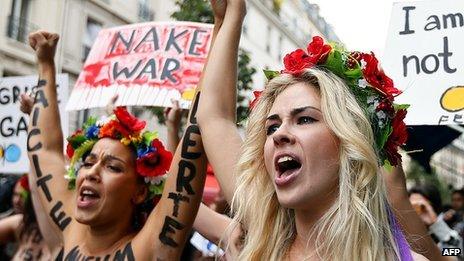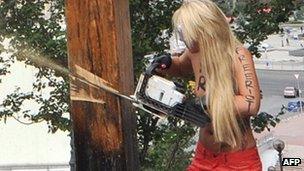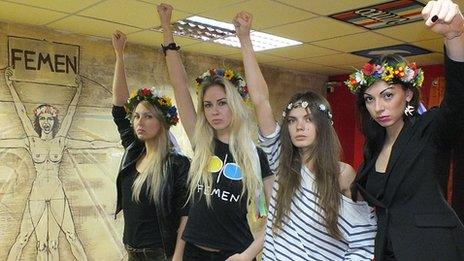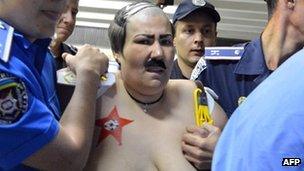Ukraine's Femen: Topless protests 'help feminist cause'
- Published
- comments

Their audacious topless stunts have earned them high-value exposure in the West - but with an approaching election at home in Ukraine, can the women's rights group Femen make a real difference?
The door to Femen headquarters is adorned with a large pair of sculpted breasts, painted in blue and yellow, the Ukrainian colours.
Despite complaining of police harassment and making plenty of enemies, they clearly have no intention of being discreet.
Inside the small, unfurnished basement flat near Kiev's main square, four women, the eldest 25, sit in a line on a bench.
Oleksandra Shevchenko, the tallest, sets out the group's ideology.
"We're fighting against patriarchy, in its three manifestations: sexual exploitation of women, dictatorship and religion," she says.
Ms Shevchenko helped found the movement in 2008 in reaction to what they saw as the belittled status of women in post-Soviet Ukraine. The fate of too many, they believed, was to be trafficked into prostitution abroad, or touted as internet brides.
'We decide'
Feminist discussion groups at a university in western Ukraine soon turned to protests in Kiev.

Femen say their attack on a cross targeted patriarchal religion
Femen did not go topless at first, but they insist stripping off has won them a wider audience for their message - without undermining it.
"For centuries, women's bodies and sexuality was used by men," says Ms Shevchenko.
"We understood we have to control our bodies and sexuality ourselves. We decide what to do with our body, our sexuality, our boobs - whether to hide it or show it."
But many Ukrainians are unimpressed by their antics. A common reaction, when they are mentioned, is to raise eyebrows or snort with derision.
People do not take them seriously, see them as self-publicists, or even suspect they are a decoy, devised to take pressure off the government they spend so much time attacking.
They have had more luck in the West. Editors have happily given space to topless feminists with slogans daubed on their chests, brandishing chainsaws.
Ms Shevchenko says sympathetic Western groups have invited them abroad and helped with their funding.
She says the group has about 40 topless activists in Ukraine, and another 100 who have joined their protests abroad.
'Sextremist' tactics
Some Western feminists have welcomed the debate they have started, and the attention they have brought to a cause that has not dominated the news for decades.
Alice Schwarzer, editor of Germany's leading feminist magazine, Emma, calls them "courageous and clever" as well as "creative".
Despite condemning the exploitation of female nudity for much of her career, she put Femen on her front cover.
"The bare breast, which would normally objectify them, becomes a weapon for them," she told the German journal Spiegel, external.

Ms Shevchenko argues that today's neo-feminists need to use "sextremist" tactics, rather than rely on arguments, to provoke a response.
"Many years ago, suffragettes used this way of protest, so I don't know why now feminists try to criticise our way.
"The young generation don't want to be classical feminists, they want to be part of a new feminism."
Their sisters in this endeavour are the women who march on Slutwalks, and the Russian punk protesters Pussy Riot.
It was partly in sympathy with the jailed Russian trio that Femen launched their most controversial protest, felling a large wooden cross in Kiev with a chainsaw, half-naked.
Their gesture was a strike against religion, they say.
That would have upset enough people in devoutly religious Ukraine. But the cross was also, according to Ukrainian media, a monument to victims of Stalin's repression in the 1920s and 1930s.
Ms Shevchenko denies this. That was a different cross, she says. Either way, the act angered and alienated many people, some of whom might otherwise be sympathetic to their cause.
It also cast a shadow over what has become a much broader human rights agenda focused on other former Soviet states.
Menaced in Belarus
At the end of the bench sits Oksana Shachko, yawning as much of the interview, in English, passes her by.
She has become associated with Femen's most overtly political stunts.

Mocking Alexander Lukashenko of Belarus has landed Femen in trouble
It was she who attempted - topless - to steal the ballot box into which President Vladimir Putin had posted his vote in this year's Russian presidential election. That cost her two weeks in a prison cell.
She also risked much worse in Belarus. Last December, on the first anniversary of his re-election, she and two others lampooned President Alexander Lukashenko, who has been described as the last dictator in Europe. They all stripped off. One had her head shaved bald and donned a lookalike moustache.
Afterwards, they decided to run for it, but could not escape Belarus' KGB. After questioning for hours, Ms Shachko says, they were hooded and driven into a forest, stripped and covered in oil, menaced with knives, and told they would never make it out of the woods.
"We were sure they'd rape us. The most nerve-wracking moment was when they made us take off our trousers and knickers and get on our hands and knees," she says.
"They had a spade with them too. When they poured oil over us we thought they'd set us on fire."
Eventually they were left to find their own way out of the forest.
Their outright defiance of Eastern Europe's strongmen is unquestionably brave. Femen argue their acts can help inspire campaigners for democracy in that region.
But whether they have made any difference in advancing the cause of women is open to question.
With Ukraine's parliamentary election coming this weekend, Femen have no faith in the main candidates.
"We don't have politicians in Ukraine," says Ms Shevchenko.
"All of them are just faces of different oligarch groups. We don't have ideas, ideologies, real parties. Only people who have a lot of money, or who have good friends who want to lobby their interests."
They certainly will not be supporting the imprisoned opposition leader, Yulia Tymoshenko, whom they believe is as corrupt and self-serving as her male rivals.
They say they have plans up their sleeve to disrupt the election campaign.
They are unlikely to make much difference to the result. But they may at least get the election some attention in the West.
- Published20 December 2011
- Published2 March 2011
- Published14 June 2012